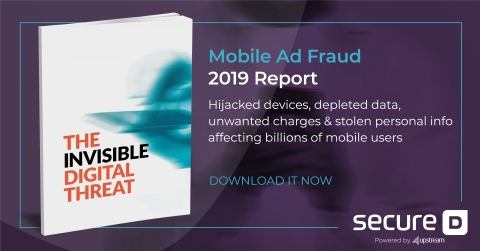93 percent of total mobile transactions in 20 countries were blocked as fraudulent in 2019 according to a report on the state of malware and mobile ad fraud released today by mobile technology company, Upstream. The “Invisible Digital Threat” data is based on deployments of Upstream’s Secure-D full-stack anti-fraud platform that detects and blocks fraudulent mobile transactions mostly originated from ad fraud malware. The platform at the end of 2019 covered 31 mobile operators in 20 countries.
This press release features multimedia. View the full release here: https://www.businesswire.com/news/home/20200129005647/en/

“The first-ever Mobile Ad Fraud report” powered by Secure-D, Upstream’s anti-fraud platform. (Graphic: Business Wire)
In the markets examined, Upstream’s security platform processed 1.71 billionmobile transactions and blocked 1.6 billion of them as fraudulent, a staggering 93 percent of total transactions. It is estimated that left unchecked these transactions would have cost users $2.1bn in unwanted charges. For the industry as a whole, losses from online, mobile and in-app advertising reached $42 billion in 2019 and are expected to reach $100 billion by 20231.
The number of malicious apps discovered by Secure-D in 2019 rose to 98,000, up from 63K in 2018. These 98,000 malicious apps had infected 43 million Android devices.
With Android devices now accounting for an estimate 75-85% of all smartphone sales worldwide2 Android is by far the most dominant mobile operating system (OS). At the same time it is the most vulnerable due to its open nature, making it a favorite playground for fraudsters.
While, as mentioned in the Secure-D report, it is always a good rule of thumb for consumers to only download mobile applications from Google’s official storefront, Google Play, thanks to its scale and set up, rogue apps are still getting through its defences. Of the top 100 most active malicious apps that were blocked in 2019, 32 percent are reported still available to download on Google Play. A further 19 percent of the worst-offending apps were previously on Google Play but have since been removed, while the remaining 49 percent are available through third-party app stores.
Fraudsters appear to target some app categories more than others. Ironically, apps designed to make a device function better and make everyday life easier are the ones most likely to be harmful with 22.32 percent of malicious apps for 2019 falling under the Tools / Personalization / Productivity category3 globally. The next most popular categories cybercriminals target are Games (18.97 percent) and Entertainment/Shopping (15.76 percent).
Indicating scale, in the course of only a few months in 2019, Secure-D reported on the suspicious background activity of five very popular Android apps: 4shared, a popular file-sharing app, Vidmate, a video downloader, Weather Forecast a preinstalled app on Alcatel devices, Snaptube, another video and audio app, and ai.type, an on-screen keyboard app. With a total of nearly 700 million downloads, these were or had been at some point available on Google Play. In these five cases alone, Secure-D detected and blocked 353 million suspicious mobile transactions preventing $430 million in fraudulent charges.
Dimitris Maniatis, CEO of Upstream commented, “Mobile ad fraud is a criminal enterprise on a massive scale. Though it may seem that it is only targeted at advertisers, it greatly affects the whole mobile ecosystem. Most importantly it adversely impacts consumers; eating up their data allowance, bringing unwanted charges, messing with the performance of their device, and even targeting and collecting their personal data. It is more than an invisible threat, it is an epidemic, calling for increased mobile security that urgently needs to rise up in the industry’s priority list. Left unchecked, ad fraud will choke mobile advertising, erode trust in operators and lead to higher tariffs for users”.
The effects of mobile ad fraud are particularly damaging in emerging markets where data costs are significantly higher. As evidenced from detailed data presented from five such markets including Brazil and South Africa fraud rates in most cases exceed the 90% mark. As Upstream’s report highlights consumers in emerging markets are more vulnerable to digital fraud; they are unaware of the dangers as they often go online for the first time via their mobile devices and data depletion caused by malware has a much greater effect on them due to the high cost of data in their countries. In Africa 1 GB of data costs prepaid mobile subscribers the equivalent of 16 hours of work at minimum wage.
Download the full report for an in-depth look at the state and workings of mobile ad fraud including insights on five emerging markets: Brazil, Egypt, Indonesia, South Africa and Ethiopia. By way of comparison, the report also juxtaposes snapshots of the state of malware in the United Kingdom and USA.
-ENDS-
1 Juniper Research
2 Statista and Statcounter
3 As these categories are Google Play Store specific, percentages apply only to apps currently or previously available on Google Play
View source version on businesswire.com: https://www.businesswire.com/news/home/20200129005647/en/











